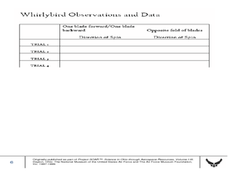Beyond Benign
12 Principle Match Up
Can you find a match? Scholars review the 12 principles of green chemistry by playing a matching game. The second lesson of the series reinforces the principles from the first lesson. Individuals play the matching game and also complete...
Curated OER
Scientific Method: How Many Drops of Water Fit on a Coin?
Young investigators conduct an experiment using the scientific method. They see how many drops of water fit on a coin; have them conduct several different trials. This involves making a hypothesis, looking at controls, and introducing...
Curated OER
Paradise Lost: Bloom’s Taxonomy of Thinking Processes
Chapter II of John Milton's Paradise Lost provides the text for a series of comprehension questions crafted using Bloom's Taxonomy.
Curated OER
Bernoulli Principle
The class conducts a simple experiment to demonstrate the Bernoulli Principle. After completing the experiment, they will discuss their findings. To prep for this activity, appropriate resource material on the Bernoulli Principle will be...
Chemistry Collective
Virtual Lab: Cobalt Chloride and Le Chatelier’s Principle
Colorful cobalt complexes make a great way to learn about Le Chatelier! Eager chemists explore equilibrium through a virtual lab. Individuals use solutions with two different concentrations and observe the color changes that indicate...
Curated OER
Organizing Principles of Plants and Animals
Three lessons and five assessments are contained in this material. Various paper shapes are sorted as a simulation of biological classification. Learners gather a list of living things that they are familiar with and design a...
EngageNY
Comparison of Numbers Written in Scientific Notation and Interpreting Scientific Notation Using Technology
Examine numbers in scientific notation as a comparison of size. The 14th instructional activity in the series asks learners to rewrite numbers as the same power of 10 in scientific notation to make comparisons. Pupils also learn how to...
Novelinks
Wildwood Dancing: Questions using Bloom’s Taxonomy of Thinking Process
Readers respond to a series of questions focused onJuliet Marillier's young adult novel Wildwood Dancing, and crafted to reflect the levels in Bloom's Taxonomy.
Science Friday
Sublime Sublimation
Dry ice isn't dehydrated water, and young scientists learn why in this fascinating presentation. After watching a video, they complete three different activities using dry ice. Upon completion, they discuss the scientific...
Curated OER
Bernoulli's Principle
Students explore Bernoulli's principle, how it is related to flight, and the effect of lift, thrust, and drag on flight. They design and develop an experiment that tests for distance traveled by their paper airplane, and record and...
Curated OER
Principles of Flight: Gyrocopter and the Scientific Method
Students explore the concept of the scientific method. In this investigative lesson plan, students investigate which direction the blades will spin on a gyrocopter. Student will practice using the scientific method to complete the...
Curated OER
More Than Meets the Eye
Students use the Archimedes method to demonstrate scientific principles behind observations.
Curated OER
Bubble-ology and Bernoulli
Students explore aerodynamics and Bernoulli's principle by devising ways to keep bubbles aloft.
Curated OER
Archimedes' Principle of buoyancy
Young scholars use the internet to research Archimedes' principle of buoyancy. In groups, they summarize the principle and share it with the class. They also participate in experiments in which they test the principle and share their...
Curated OER
Part I: Principle of Effective Writing
Designed for higher education, this 151-slide presentation focuses on effective writing techniques, specifically in scientific manuscripts. While the slides contain readable amounts of text (none are text heavy), consider spreading this...
Curated OER
Designing Experiments - Procedures for Teachers
Young scholars evaluate a hypothetical experimental design and attempt to improve upon it. In this scientific method lesson, students are presented with an experiment and are instructed to determine its flaws. They conduct their own...
CK-12 Foundation
Development of Theories
Theory or Law? You decide. And so will your class members, in an insightful interactive. Young scientists divide common scientific principles or statements between the two groups, then dig deeper in understanding the functions of...
Curated OER
My Antonia: Bloom’s Taxonomy Questions
How well do your pupils know My Antonia by Willa Cather? Take some time to create questions about the text. After examining a teacher model, individuals write questions that match each level of Bloom's Taxonomy and draft answers to these...
Curated OER
Wind Power
What a wonderful way to explore wind power! Through this instructional activity, learners get a background in the history of wind power, create their own wind turbine, and the test their designs. This is a terrific way to tie scientific...
University of North Carolina
Sciences
Science writing follows many of the same principles as writing in language arts, but some structural details differ. Individuals read an online science handout that covers how to write with precision, choose appropriate details, and use...
Howard Hughes Medical Institute
Sorting Seashells
Scientists use morphological, physiological, and molecular information to continually revise organism classification. Scholars observe and learn about 20 shells. Then, they work to sort and classify the shells, building a taxonomy based...
Curated OER
Apply Scientific Inquiry and Scientific Habits of Mind
Pupils review the components of the scientific inquiry method. In groups, they apply this method to various experiments they are given to complete. They also use the correct scientific habits of mind when researching different concepts.
Curated OER
Apply Scientific Inquiry and Scientific Habits of Mind
Students review the components of the scientific inquiry method. In groups, they develop hypothesis on a variety of different topics and design an investigation or experiment to test it. They share their conclusions with the class and...
Curated OER
Introduction to Scientific Theory
Ninth graders explain how scientists set up investigations. In this scientific process lesson, 9th graders review the principles of the scientific method and use these skills to answer an open-ended question about how to set up a...

























